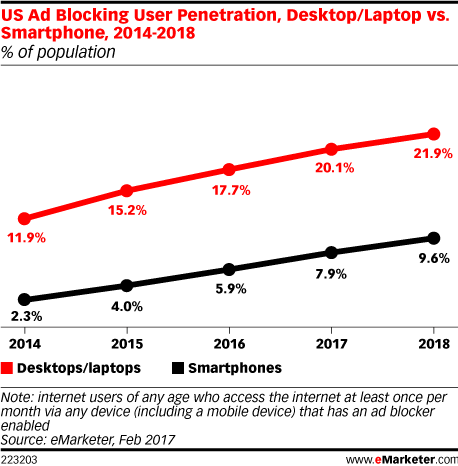A recent report out of eMarketer revealed that while mobile ad blocking usage is still relatively low compared to its use on desktops and laptops, it’s steadily growing.

8% isn’t a lot right now in 2017, but the mobile industry has been closely monitoring ad blockers on smartphones because of what it might mean for the mobile economy as a whole. Keep in mind two things: 1) starting last year, global internet traffic is now mostly via mobile, and 2) mobile ads have been propping up the advertising industry as of late. You can see why the industry is so concerned about mobile ad blockers. So how did we get here and where are we going?
The advent of ad blockers, or, the crippling of publishing.
Remember those awful Flash-based display ads that were everywhere in the early internet days?

*Shudder*. Eventually, a bunch of smart people sick of these awful ads created ad blocking software which hit the masses in 2013. For a time, this was a blessed relief for internet users. Ugly ads that slowed down websites were removed, and it had the side effect of shuttering many businesses that preyed on stray eyeballs/clicks to artificially inflate traffic numbers.
But as the popularity of ad blocking software increased, legitimate businesses began to suffer. The most notable example is journalism. Going from print to digital was bad enough, as display ads were less profitable than print ads, but the advent of the ad blockers effectively bankrupted many smaller publishers and left the industry scrambling for revenue to this day.
Bowing to the ad blocking gatekeepers.
Last month, Digiday reported that UK publishers are losing $2.6 million each year due to ad blocking software, and that if left unchecked, it could cost all publishers $35 billion in the next few years. The issue is so dire that we’ve all seen big content publishers like Forbes or the New York Times begging visitors to whitelist their sites on the various ad blocking extensions people use. Tech giants like Amazon and Microsoft basically have to pay a ransom to owners of ad blocking software to get ads through. It’s a weird world we’re living in.

And the scariest part only happened recently, as Google and Apple announced they would be integrating their own ad blocking software into Chrome and Safari. Come again? Doesn’t Google exist off of ads? Well ostensibly, as the linked article mentions, Google is working with other tech companies to improve ads via industry-wide standards as outlined by the Coalition for Better Ads. Founding members include Google, Facebook, and over a dozen other companies.
The theory is that if ads are better, then consumers will allow them back into their lives/screens. This philosophy also applies to Google’s AMP project (Accelerated Mobile Pages); the better the mobile experience is, the less likely users will use ad blockers. It’s a nice theory, but the numbers haven’t shown any sort of slow down in mobile ad blocking. The implications are clear, however: the major publishers have lost the desktop war, so they’re trying to get ahead on the mobile front.
Ad blocking the future of the internet.
So where do we go from here? Well, there’s a lot of speculation but no solid answers. Some think that this is the death of free online content, and the state of digital journalism definitely seems to back that up. Others think display ads on mobile will also fall out of use, and this will shift marketing to more P2P options like affiliate and influencer marketing. Still others think Google, Facebook, and Apple can wrestle back control of the internet from the ad blockers due to their control of the content platforms.
Personally, I’m not sure who’s right, but there are a few things to consider in the near future for mobile-first businesses. First, there is a stark difference between apps and the mobile web. Specific to this topic, some ad blockers do block ads on both browsers and in apps, but apps have many other ways of pushing advertisements such as through referral partnerships. Not relying on just your mobile website and instead working on your own app is a defense against mobile ad blockers. Second, mobile ad blocking adoption is still low. Getting your customers to trust your mobile business now, so they won’t feel the need to block ads on your app/mobile site, will pay dividends in the future.
Third, all this is pretty familiar if you lived through Napster. Through the 90s, the music industry was riding high on CDs that cost $20 a pop. When Napster hit, and suddenly music became “free,” the genie was thought to be out of the bottle. The music industry freaked out, lawsuits were thrown about, and they kicked and screamed and railed against this sudden onset of technology. But after licking their wounds, they gave the consumers what they wanted all along: an easier, cheaper way to buy music; and now suddenly everyone is paying for music again.
I think that’s what will happen with advertising. We’re in for a ride until it’s figured out, but there will be something better for consumers at the end of the tunnel.
What do you think about the mobile ad blocking movement?







